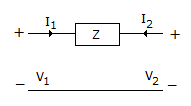ECE :: Network Analysis and Synthesis
-
When analysing two port networks in cascade, it is more convenient to use
-
For a transfer function H(s) = P(s)/Q(s), where P(s) and Q(s) are polynomials in s
-
The inductance of a coil can be increased by
-
Consider the following statement : If a network has an impedance of (1 - j) as a specific frequency, the circuit would consist of series
- R and C
- R and L
- R, L and C
-
The minimum permissible size of aluminium cable for lighting circuit is
-
Assertion (A): In a parallel circuit having two branches, each branch current may be more than source current.
Reason (R): Calculations in ac circuits use rules of complex algebra.
-
Which one of the following parameters does not exist for the two port network shown in the given figure?

-
Current density J, conductivity σ and electric field E in a conductor are related as
-
If a driving point function N(s) = p(s)/q(s), then


 Whatsapp
Whatsapp
 Facebook
Facebook


